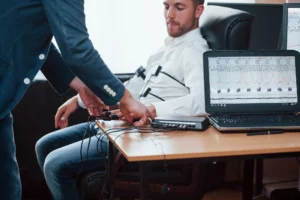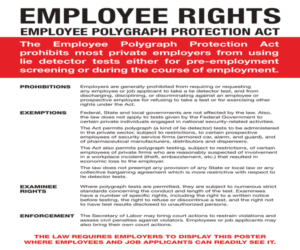Choosing a polygraph provider is an important decision. The results of a test can have significant consequences on your life. Unfortunately, not all examiners and services are created equal. There are a number of red flags you should watch out for to make sure you choose a legitimate and reliable business.
Claims of 100% Accuracy

One of the biggest red flags is any provider that claims their tests are 100% accurate or guaranteed. No polygraph test is 100% accurate. The American Polygraph Association says the accuracy of a properly conducted polygraph test is between 90-95%. A service that claims 100% accuracy is exaggerating their capabilities.
This doesn’t mean the test is worthless. Polygraphs are still a useful tool, but they aren’t foolproof. A reputable vendor will be upfront about the limitations and error rate.
Refusal to Provide References
A quality examiner should be able to provide references from past clients. Of course, due to confidentiality, they may not be able to provide specifics. But they should at least be able to put you in contact with past customers who are willing to vouch for their service.
If a company refuses to give any references, it could be a sign they don’t have a long track record or their past clients were unsatisfied. Ask for references and actually contact them. A lack of references is a big red flag.
Vague Pricing
The cost of a polygraph can vary quite a bit from one provider to another. However, the pricing should be straightforward and clearly explained up front. A company that is vague about pricing or won’t provide quotes is suspicious.
You want to avoid any bait-and-switch tactics where they hook you in with a low price and then tack on a bunch of hidden fees once you arrive for the actual test. Get quotes in writing so there is no confusion. Don’t rely solely on verbal discussions, ads or website prices.
Claims the Test Can’t Be Beaten

Dishonest companies may claim their polygraph test “can’t be beaten” and imply you don’t need to worry about countermeasures. Although extremely difficult, a highly trained individual can beat it with specific countermeasures.
A reputable service will account for countermeasures in its process. You may be asked about countermeasures you’ve used. But claiming their test is immune is dishonest and unrealistic.
Unqualified or Shady Examiners
Make sure to vet the qualifications, certifications and background of the examiner who will conduct your test. They should be a member of a professional organization like the American Polygraph Association. Don’t hesitate to ask about their education, training and experience.
Also do your own research on their reputation and history. Search online to see if anything questionable pops up. An unqualified, shady or disreputable examiner calls the whole service into question.
Refusal to Customize Tests
Legitimate reasons for polygraph tests can differ greatly – from employment screening to infidelity concerns and more. A one-size-fits-all test isn’t ideal for every situation.
A quality service will take the time to understand your particular needs and customize the test accordingly. For example, the questions will be tailored to your particular goals for the test. If a provider offers blanket tests or refuses to customize, go elsewhere.
Rushing You Through the Process

An examiner should spend adequate time explaining how the test works, going over the questions in advance, getting your background and putting you at ease. Quality tests take time. The whole process should take a few hours.
If you feel rushed through the process, that’s worrisome. The examiner is likely more concerned about volume and money than doing an accurate job. Take your business elsewhere if you feel hurried or shortchanged on time.
Unprofessional Conduct
The examiner should maintain a professional demeanor throughout the entire process. This includes:
- Politeness
- Clear communication
- Respecting your privacy
- Answering your questions
- Making you feel comfortable
Any unprofessional or inappropriate conduct – rudeness, disorganization, bad hygiene, sexual advances, etc. – is unacceptable. Don’t ignore your instincts if something feels wrong or “off.”
Testing Methods Don’t Align With Your Needs
Make sure you understand the processes, technology and testing approach before committing to a polygraph service.
For example, some tests rely solely on yes/no questions that can be restrictive, while others use a Discussion Technique with more open-ended questions. Know what methodology best fits your situation.
If their methods don’t make sense or align with your goals, they may not be the right fit. Don’t be pressured into any testing approaches you’re uncomfortable with.
Refusal to Explain Reason for Failure

If you “fail” the test, a professional examiner should take time to explain which questions you had a significant reaction to and go over the details with you. Pass or fail, you deserve an explanation.
A company that refuses to explain test results or quickly rushes you out may not have confidence in their own methods and accuracy. You want transparency, not secrecy.
How to Find a Reputable Service
Avoiding disreputable polygraph operators is the first step. Here are a few tips to help you positively identify a professional and reliable service:
- Ask for referrals from trusted sources like attorneys, HR managers, or therapists who have experience with polygraphs.
- Search online reviews and check the Better Business Bureau for complaints.
- Interview examiners in person and confirm qualifications before committing.
- Compare multiple quotes to gauge reasonable pricing – cheapest isn’t always best.
- Go with established experts who have been consistently operating locally for many years.
- Trust your gut – if something feels wrong or sketchy, it probably is.
Ask About Analysis and Scoring Methods
Get details on:
- Do they use computer algorithms or subjective human analysis to score results?
- What mathematical threshold do they use to indicate deception?
- Do they calculate scores question-by-question or use global scoring?
- Do they have methods to adjust scores based on your individual baseline physiology?
- How do they factor in your reactions to control questions when analyzing responses to key questions?
- What quality control measures do they have around analysis like double checking by a second examiner?
Make sure their analytical methods align with research-backed best practices.
Consider Opting for a Blind Analysis

To avoid any conscious or unconscious examiner bias, ask if they offer blind analysis. This means the examiner administering the test is different than the one analyzing the results. The analyst is then “blind” to anything beyond the raw data.
While adding cost, blind analysis can improve impartiality and scientific rigor.
Ask About Post-Test Consultation
Quality examiners should spend time interpreting and explaining your results once the test is complete. Important questions:
- How long will you spend going over my test results with me?
- Can you provide advice on any next steps based on the outcomes?
- Will you answer any additional questions I have after the appointment?
- Do you offer any re-testing if I have concerns about accuracy?
Poor examiners provide results and rush clients out the door. You want ample review and discussion time.
Consider Having an Observer
Some examiners allow you to have a spectator like an attorney or friend. Their role is limited to watching quietly from another room or behind a one-way mirror. This can provide a neutral third-party perspective and additional accountability.
Don’t Be Afraid to Walk Away
Trust your gut feeling throughout the vetting process. If anything gives you pause about an examiner, it’s okay to walk away and keep looking. Don’t let desperation or urgency cloud your judgment – take your time finding the right professional.
Conducting Your Own Vetting

Here is a recap of some key questions to ask:
- How long have you been in business?
- What is your background, education and training as a polygraph examiner?
- What professional associations do you belong to?
- What methods and question types do you use?
- Do you customize tests based on individual needs?
- What is your accuracy rate?
- What explains how results are analyzed?
- Can you provide references from past clients?
- Will I have a chance to review the questions in advance?
- Do you explain failed test results to clients?
- What is the full cost and are there any hidden fees?
Get all answers in writing when possible and do your due diligence. Don’t cut corners when picking a polygraph service. Vet them thoroughly using this checklist to identify red flags and choose a reputable, professional provider you can trust.

